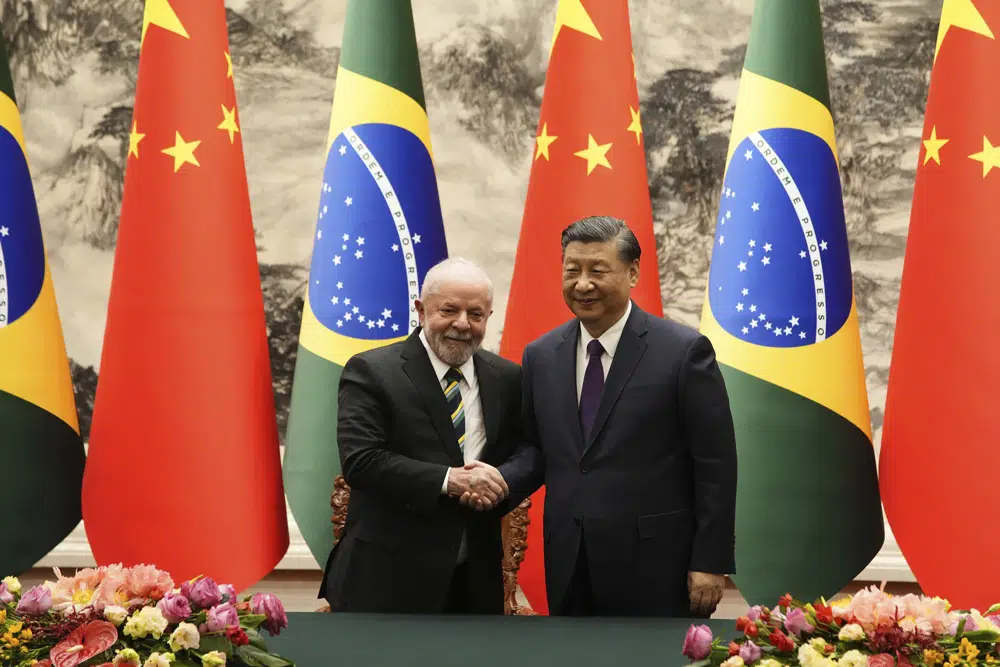China, Brazil pledge better future for bilateral ties as Xi meets Lula

Beijing, The Gulf Observer: “Friendship is like a bottle of wine, the older, the better.” Quoting the Brazilian proverb, Luiz Inacio Lula da Silva hailed the relationship between China and Brazil as “extraordinary” in Shanghai, the first leg of his four-day state visit to China.
The Brazilian president’s assessment of the bilateral relations was echoed by President Xi Jinping, who addressed Lula as “an old friend” during their face-to-face talks on Friday in Beijing.
China will pursue high-quality development, accelerate the creation of a new development paradigm and promote high-standard opening-up, which will unlock new opportunities for Brazil and countries around the world, Xi said.
As comprehensive strategic partners, China and Brazil share extensive interests, he said, underscoring the importance of the bilateral ties’ overall picture and their strategic and global significance.
Xi added, a China-Brazil relationship that continues to enjoy a sound and steady growth is bound to play an important and positive role in peace, stability and prosperity in their regions and beyond.
‘A new future’ for bilateral ties
China always views and develops relations with Brazil from a strategic and long-term perspective, and regards the relationship as a high priority on its diplomatic agenda, Xi told Lula during Friday’s talks.
He encouraged both sides to increase cooperation and push forward major projects, and expressed China’s willingness to explore greater synergy between its Belt and Road Initiative and Brazil’s re-industrialization strategy.
China has been Brazil’s biggest trading partner for 14 consecutive years. In 2022, two-way trade totaled $171.49 billion, up 4.9 percent year-on-year, according to the General Administration of Customs of China.
As their economic relationship grows, both countries have decided to trade in their own currencies, ditching the U.S. dollar as an intermediary. The Chinese currency, the renminbi, has surpassed the euro to become the country’s second-largest international reserve currency, the Central Bank of Brazil announced at the end of March.
Lula told the Chinese president that Brazil hopes to expand cooperation with China in 5G communications technology, and welcomes Chinese investment in the country to help it secure a digital transformation and low-carbon development.
He visited the R&D center of Huawei, the Chinese tech giant that has been put under restrictions by the U.S. government citing national security threats, on Thursday in Shanghai, where he arrived with a delegation of more than 200 business people across 140 industries, dubbed as “epic” by Chinese social media users.
A deepened cooperation between the two countries will contribute to Brazil’s re-industrialization and poverty relief efforts, said Lula.
Xi expressed his readiness to work with Lula from their strategic vantage point to steer and create a new future for China-Brazil relations in the new era, and to deliver greater benefits to the two peoples.
After the talks, the two heads of state witnessed the signing of a wide range of bilateral cooperation documents, such as in trade, investment, digital economy, science and technology innovation, information and communications, poverty reduction, quarantine and aerospace.
The two sides also issued a joint declaration to deepen the China-Brazil comprehensive strategic partnership.
Support for multilateralism
Lula’s visit to China, his first trip to a country outside Latin America since he took office in January, comes amid geopolitical changes.
In the face of global changes of a magnitude unseen in a century, China and Brazil, the two biggest developing countries and emerging markets in the Eastern and Western hemispheres, should “stand on the right side of history” and “practice true multilateralism,” said Xi.
China is willing to strengthen strategic collaboration with Brazil on global issues of common concern within the multilateral frameworks of the United Nations, BRICS and the Group of 20, and to enhance coordination and cooperation on climate change, he added.
Together with Russia, India and South Africa, China and Brazil formed BRICS, an emerging-market group that now contributes 31.5 percent of global GDP, according to one estimate.
Attending the inauguration ceremony of the new president of the BRICS-founded New Development Bank on Thursday, Lula said the bank is the product of a partnership among BRICS countries with a view to creating a world with less poverty, less inequality and more sustainability.
During Friday’s talks, he said that Brazil is ready to work with China to promote developing countries to get rid of “the shackles of unfair rules” and achieve more fair and balanced development.
The two leaders also exchanged views on the Ukraine crisis, with both agreeing that dialogue and negotiation are the only feasible way for settling it and that all efforts that are conducive to its peaceful resolution should be encouraged and supported.